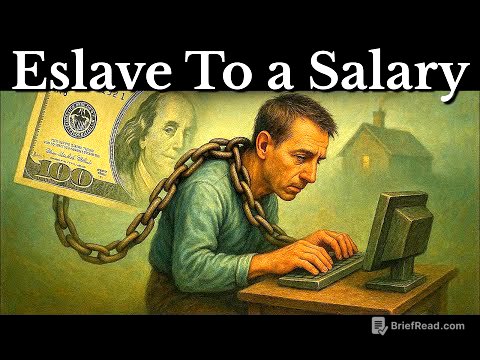TLDR;
This video discusses the potential downfall of the US economy due to ongoing trade tensions and tariff disputes, particularly with China. It highlights China's resilience and strategic moves to counter US pressure, including diversifying export markets and developing advanced technologies. The video suggests that the US tariff strategy is unlikely to succeed and could lead to negative economic consequences, such as a weaker dollar, inflation, and a potential recession. It also explores alternative solutions, such as embracing digital assets like Bitcoin and focusing on digital products and services to maintain economic dominance.
- The US tariff strategy is unlikely to succeed and could lead to negative economic consequences.
- China is strategically countering US pressure by diversifying export markets and developing advanced technologies.
- The US economy could face a weaker dollar, inflation, and a potential recession.
- Alternative solutions include embracing digital assets like Bitcoin and focusing on digital products and services.
Introduction: The Unsettling Truth About US Tariffs [0:00]
The video begins by expressing concern over the lack of transparency from the White House regarding trade talks with China. The speaker suggests that the US is not engaging in trade talks with China, and revealing this truth could lead to a loss of faith in the US economy and a potential collapse of the US dollar. This situation could diminish the US's leverage in trade deal negotiations, necessitating preparation for a potential economic downturn.
China's Response: No Kneeling [2:11]
China has released a video warning countries against caving into US tariff demands, referencing historical instances where the US imposed tariffs and increased pressure on countries like Japan and France, leading to economic consequences. The video argues that compromise only invites more bullying and asserts that China will not back down. This response was not the desired outcome, as the US had hoped for China to concede.
Grock's Analysis: Unlikely Success of US Tariffs [3:13]
According to Grock, the US tariff strategy is unlikely to succeed in reducing the trade deficit, protecting US industries, or pressuring China for concessions. China has diversified its export markets, reducing its reliance on the US. Additionally, China's non-tariff retaliation, such as rare earth restrictions, strengthens its strategic position. China is also building trade ties with Southeast Asia, the EU, and Japan, countering US isolation efforts.
Potential Consequences of Tariff Failure [4:17]
Failure of the tariff strategy could result in no significant reduction in the trade deficit, no boost to US manufacturing or job creation, and no concessions on trade or other issues. This could lead to negative economic, political, and geopolitical fallout, including dollarization and reduced global dollar demand. The dollar index could fall, and other nations may wait for China to sign a trade deal before making any concessions.
China's Rise and US Isolation [5:02]
China is portrayed as standing up for other nations and lighting the way for the free trade world. The US does not represent the entire world, and other countries are standing together in solidarity against US pressure. The US is depicted as a small, isolated entity, while China is taking on a leadership role.
Consumer Impact and Personal Strategy [5:50]
The speaker emphasizes that tariffs are a consumer tax and shares a personal decision not to pay them, anticipating that they will be lowered in the future. It is suggested to stock up on necessary supplies or reduce spending altogether. Reports indicate that shipping container costs could decrease, and there is a possibility of empty store shelves.
Economic Downturn and Investment Shifts [7:00]
The video discusses the potential for a US recession, with decreased tourist arrivals and foreign investors dumping US equities. World central banks are diversifying their reserves, moving away from US assets and investing in alternatives like Bitcoin or gold. This indicates a shift in global economic confidence away from the US.
Technological Competition and Innovation [7:55]
China is making significant advancements in technology, with companies like Alibaba developing AI models that outperform US counterparts. Huawei is also developing a new AI chip to compete with Nvidia. This diminishes the US's technological advantage and leverage in the trade war. Additionally, China is making progress in autonomous driving and satellite internet services, challenging US dominance in these areas.
Economic Crisis and Market Dynamics [9:22]
The US economy is showing signs of strain, with companies like UPS and Expedia laying off employees. US farmers are in crisis due to plunging Chinese orders for pork and soybeans. The American consumer is becoming poorer, leading to business closures and a potential US recession with bankruptcies and layoffs. Inflationary prices are rising, and the dollar is weakening, limiting the ability of the Federal Reserve to stimulate the economy.
Ray Dalio's Warning and Systemic Collapse [11:12]
Ray Dalio suggests that significant changes are coming and that the problems won't go away, implying that the dollar is in decline. The combination of inflation, a collapsing dollar, and a recession could lead to a systemic collapse, wiping out American wealth and causing a lost decade. The US initiated a trade war but is passively waiting for a call, while competitors are actively making deals and reinvesting in their economies.
Losing the Trade War and a Multipolar World [12:33]
If the US loses the trade war, it could lead to the emergence of a multi-olar world where the US has lost trade dominance and leverage. The US's position as the great American consumer would be revealed as a weakness, leading to worse trade deals and devaluation of US assets. This could result in a massive loss of American wealth, similar to what happened in Japan in the 1980s.
Alternative Strategies: Bitcoin and Digital Assets [13:25]
The speaker suggests investing in Bitcoin, gold, and non-US correlated assets. A proposal is made for the US government to buy up Bitcoin, driving the price up and using it as collateral to pay off the national debt. The video advocates for embracing the metaverse, building digital assets, and establishing the dollar as the global reserve currency with Bitcoin as the global reserve asset. This approach could help the US maintain economic dominance in the digital age.









